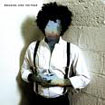
Emanuel and The Fear: Listen (Paper Garden)
The more things change, the more they don't alter much at all. It has taken over three decades for the kind of involved proceedings that soundtrack the world of the wonderfully eclectic Emanuel and the Fear to find favor once again. Sins do get eventually forgiven, even the excessively pretentious crimes and misdemeanors of classically influenced Prog. Listen opens with a slow-building thunderstorm edging into a jazzy radio station, but then the proceedings erupt into "Guatemala," a manic, flute-driven cross between ELP and Jethro Tull.
The musicianship is precisely wild, in the way that only a classical approach or jazz can be, and hints at a horde of terribly disappointed music teachers bemoaning the unorthodox direction that their talented charges have chosen to embrace. What follows are songs drawn from an eclectic palette.
"Ariel & the River" could be David Byrne on a strange and spacey street rap, wonderfully underscored with violin and flute running ahead of the quirky drum track. It also betrays a certain trace of Rufus Wainwright breaking into a sublimely classical stride, whilst the whistled intro to "Jimmie's Song" sounds like Paul Simon at his conversational finest and has a faintly gypsy, insidiously catchy edge, with semi-African, slightly Spanish inflections. Occasionally the sound borders on Yes without Jon Anderson's annoyingly ethereal interventions.
Emanuel Ayvas possesses a voice that shears the sound of such malpractices, so this isn't merely some '70s reheat. It has an eloquent grittiness that lends an aura of modernity; although "Dear Friend" owns a Beatlesque chamber feel, it also sounds fresh and spirited.
There is a darkly epic, somewhat theatrical flair, over slightly crazy percussion, to "Trucker Lovesong," which could be Lou Reed in Velvets mode collaborating with his spouse, Laurie Anderson, ending in a stark kind of electro-classicism. The album has no breaks between tracks; cinematic instrumental interludes of tremendous charm link the songs.
"Balcony" is a hauntingly poetic piano ballad of the kind favored by Patrick Wolf and Antony, and wears a moody nonchalance which allows it a bare beauty drowning in strings, finally and discreetly signed off a la Randy Newman. "Whatever You Do" has a McCartney-esque tinge and a wonderfully upbeat refrain that goes part of the way in explaining the Polyphonic Spree tag the band has acquired.
A weary louche quality drives and shapes "The Raimin." Effortless and refined, it drifts along, a magical song of grand world-weariness. If there is an unintentional flaw at the album's heart, it is that the work could be a little too arch to crack the public's reserve, but then "Same Way" appears and is so radio-friendly, it deserves to dominate the airwaves, in this or any summer, by owning the infectious kookiness of Regina Spektor.
"Simple Eyes" grows like a small symphony left as a voice mail, a tiny exercise in perfection. "Song for a Girl" has a south-of-the-border darkness; its arrangement owes much to the work of Esperanto, especially their album Last Tango. A classical sensibility betrays an affinity of style, which is why those who operated in such a domain many years ago echo in these more modern hands.
As the album ends there is a strange suggestion of Grieg, and all goes full circle ending with the sound of thunder that heralded its arrival, and departs in a jazzy street poem finale.
In the world of American Idol and X Factor, the arrival of such individual -- and in this case, collective -- idiosyncrasy is something to savor, share, and admire. You might not get Emanuel and the Fear in only one listen, but when they do click, they will stay with you for a very long and rewarding time.
